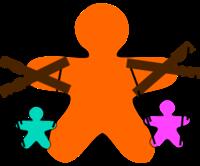Love Styles – Are You a Controller?

Do you know someone in your life who is a controller? When problems in marriage or relationships arise, controllers will show up in your life from time to time. Continuing in our series on love styles in relationships as identified by Milan and Kay Yerkovich, we will be discussing the Controller love style. If you haven’t been reading the series to this point, please go back to the beginning and start with the Avoider or the Pleaser love styles. Simply go back to the blog link, and you will see several types of love styles which you will find helpful. If you aren’t certain as to what your dominant love style you might be, you can go take the Yerkovich’s love style quiz, as well.
Controller Love Style Defined
The Controller Love Style displays many of the following unhealthy characteristics:
- You feel the need to control all of life, be the one pulling the strings – its situations, its people, and its environment
- You feel as though one is either in control, or being controlled
- Control is a way of ensuring that you don’t experience any pain, hurt, or rejection
- You keep or gain control through anger, intimidation and manipulation
- You may not feel the need to control all the time, but when you do, your need must be satisfied
As we’ve said throughout this series, you may not exhibit all the qualities of the Controller love style, but if you display enough of them to identify with, then you probably are a Controller. The Controller love style can also be a sub-dominant love style – as we can display characteristics of all 5 love styles to one degree or another. Knowing that you have, or are, a Controller love style can help you in healing past relationships, and moving toward a more healthy love style.
The Controller Love Style Background
The Controller love style forms in an unsafe, chaotic, and often abusive childhood. Controllers learn to cope by becoming strong, doing whatever they can to protect themselves from the pain and uncertainty in their homes. They often see anger and manipulation as the way to get what they want, and use it to their advantage. Controllers also often turn to drugs, alcohol, or food to deaden the pain of past hurts, and the loneliness their controlling behaviors create. Unmet needs for love and comfort become unresolved anger and resentment. Oftentimes, the Controller love style individual has had no one with whom they can depend, therefore learning to only trust and truly rely on themselves. This can cause havoc on their relationships, as they deem everyone else weak or untrustworthy.
The Controller Love Style and Therapy
The Controller love style need not stay angry, resentful and incapable of healthy relationships forever. Nor do they need to stay trapped in their addictions and pain-dulling behaviors. Through therapy, the Controller love style can learn to:
- Learn to talk about your painful experiences, and accept the comfort others can give you now
- Let go of your anger and resentment, as you no longer need those feelings as an adult
- Allow yourself to trust others, and no longer feel the need to be in control all the time
- Accept that peace and calm can be a part of life, and that you don’t need high energy situations to be content
- Learn that your need to control is more about fear and pain than it is about the other person’s weakness or your strength
You don’t have to go through life angry, manipulative, the one whom everyone fears, addicted to unhealthy behaviors, or feeling alone. Cut those strings tying you to the past, and let go of the strings of the present. Through therapy, you can relearn how to deal with those painful past experiences, and get you on the road to a brighter, happier, more peaceful future.
Contact Jousline Savra today or click on the top part of this page to schedule for an appointment. Her therapy counseling practice is in Roswell, GA on Canton Street. She is awaiting your call. If you contact her by email, please Do Not include any sensitive or clinical information pertaining to your relationships. The purpose of your email is meant only to request an appointment. Please give specific days and times that you can meet. Otherwise, there will not be a reply to your email. This is for your privacy. Thanks for your attention to this.